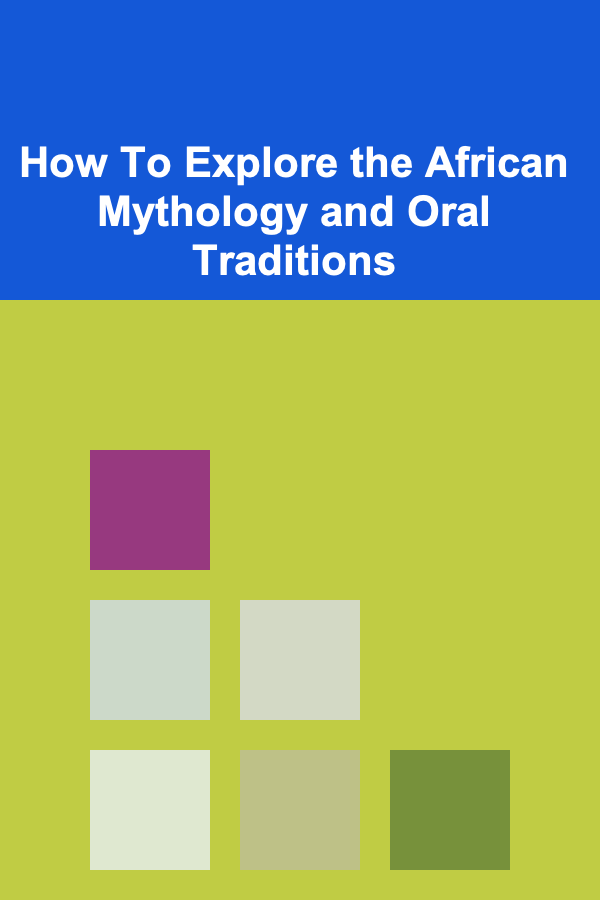
How To Explore the African Mythology and Oral Traditions
ebook include PDF & Audio bundle (Micro Guide)
$12.99$10.99
Limited Time Offer! Order within the next:

The vast and variegated tapestry of African mythology and oral traditions stands as one of humanity's most profound intellectual and spiritual legacies. Far from being a monolithic entity, Africa is a continent of immense cultural, linguistic, and historical diversity, each region and ethnic group contributing unique narratives, cosmologies, and worldviews. These traditions are not mere relics of the past; they are living, breathing repositories of ancestral wisdom, ethical frameworks, historical memory, and artistic inspiration that continue to shape contemporary African societies and resonate globally. To explore them is to embark on a journey that challenges preconceived notions, demands intellectual rigor, and necessitates a deep commitment to cultural respect and ethical engagement.
This comprehensive guide aims to illuminate the multifaceted pathways for delving into the richness of African mythology and oral traditions. It will traverse the theoretical underpinnings, practical methodologies, and ethical considerations necessary for a meaningful and responsible exploration. By understanding the intrinsic nature of orality, appreciating the thematic depth of the narratives, and employing a range of interdisciplinary approaches, one can begin to uncover the profound philosophical insights, vibrant artistic expressions, and enduring spiritual resilience embedded within these invaluable cultural treasures.
The Intrinsic Nature of African Oral Traditions: Living Epistemologies
Central to understanding African mythology is grappling with the concept of orality. Unlike traditions primarily transmitted through written texts, African myths, histories, proverbs, songs, and epic poems have historically been conveyed from generation to generation through spoken word, performance, and mnemonic devices. This fundamental difference dictates the very nature of these traditions, conferring upon them a unique dynamism, fluidity, and contextual dependence.
Orality as a Primary Mode of Transmission
In oral societies, knowledge is not static. It is a living entity, constantly reaffirmed and reinterpreted with each telling. This doesn't imply inaccuracy or instability; rather, it speaks to an adaptive system where narratives are intricately woven into the fabric of daily life, ritual, and communal memory. The storyteller, often an elder, a griot (in West Africa), a praise singer, or a community shaman, is not merely a reciter but an active interpreter, a historian, an artist, and a moral guide. Their performance -- encompassing tone, gesture, music, and audience interaction -- is integral to the meaning and impact of the narrative.
The absence of a fixed, canonical text allows for regional variations, contextual adjustments, and the integration of new experiences, ensuring the tradition remains relevant to evolving social realities. This fluidity is a strength, enabling resilience and adaptability, yet it also presents a challenge for external researchers seeking definitive versions. There often isn't one "correct" version of a myth, but rather a spectrum of authentic expressions.
The Performance Aspect and Communal Context
African oral traditions are rarely isolated recitations. They are often embedded in ritual, ceremony, festivals, and daily communal activities. A myth might be recounted during an initiation rite, a historical epic sung during a festival, or a proverb invoked during a dispute resolution. The performance itself is a participatory act, fostering collective memory and reinforcing social cohesion. Music, dance, drumming, and visual arts (like masks or sculptures) frequently accompany storytelling, creating a multi-sensory experience that deepens understanding and emotional resonance.
For example, the Mande tradition of the griots (jeli in Mali, gawlo among the Fulani) illustrates this perfectly. These professional bards are repositories of vast historical narratives, genealogies, epic poems (like the Epic of Sundiata), and social commentary. They perform using instruments like the kora or ngoni, their narratives evolving in real-time, engaging their audience, and serving as vital links to the past and moral guides for the present.
Interconnectedness with Life, Religion, and Philosophy
Unlike Western categorizations that often separate religion, history, law, and literature, African oral traditions demonstrate a profound interconnectedness. A creation myth is not just a theological statement; it also explains social order, justifies political structures, provides ethical guidelines, and offers therapeutic solace. Myths often articulate profound philosophical concepts: the nature of existence, the relationship between humanity and the divine, the importance of community (e.g., the concept of Ubuntu in Southern Africa: "I am because we are"), destiny, justice, and the cycle of life and death.
For instance, Yoruba cosmology, centered around Olodumare (the Supreme Being) and the Orishas (deities), offers a complex philosophical system that informs social roles, individual destiny (ori), and ritual practice. Similarly, the Dogon people of Mali possess an intricate cosmology that is interwoven with their architecture, astronomy, and daily rituals, reflecting a holistic worldview where all aspects of life are imbued with sacred meaning.
Key Thematic Threads and Archetypes in African Mythology
Despite the immense diversity, certain thematic patterns and archetypal figures recur across various African mythologies, offering points of entry for comparative understanding while always acknowledging specific cultural nuances.
Creator Deities and Cosmogony
Many African mythologies feature a Supreme Being, often a distant and transcendent creator, who set the universe in motion but then withdrew, leaving the day-to-day management to lesser deities, spirits, or ancestors. Examples include:
- Olodumare/Olorun (Yoruba, Nigeria/Benin): The ultimate source of creation, energy, and destiny.
- Mawu-Lisa (Fon, Benin): A dual-gendered creator deity (Mawu the moon-goddess, Lisa the sun-god) who gave birth to the universe and its phenomena.
- Unkulunkulu (Zulu, Southern Africa): "The Old, Old One," who came from the reeds or out of nothingness, bringing humans and animals into existence.
- Nyame (Akan, Ghana): The Supreme Being, often associated with the sky, who is transcendent but can be approached through His children (the Abosom) and the ancestors.
Creation myths often explain the origin of humanity, the natural world, death, and the establishment of social order, often emphasizing the initial harmony broken by human transgression or misunderstanding.
Trickster Figures: Agents of Chaos and Order
Perhaps one of the most recognizable archetypes, trickster figures are pervasive across African mythologies. These characters embody paradox: they are clever but foolish, creative but destructive, moral but amoral. They disrupt the status quo, often causing trouble, but inadvertently bring about change, teach lessons, or reveal truths.
- Anansi the Spider (Akan, West Africa): A master manipulator, Anansi often outwits larger, more powerful beings. His stories explain the origin of stories themselves, the distribution of wisdom, and the consequences of greed or cunning.
- Elegba/Eshu (Yoruba): A powerful Orisha who stands at the crossroads, representing unpredictability, communication, and the messenger between humans and the divine. He can bring misfortune or opportunity, depending on how he is acknowledged.
- Hare/Tortoise: Common trickster figures in Southern and East African tales, often using their wits to overcome stronger adversaries, teaching lessons about perseverance and cleverness.
Trickster tales are vital for social commentary, allowing for the questioning of authority and the exploration of moral ambiguities in a humorous and accessible way.
Ancestors and Spirits of Nature
Veneration of ancestors is a cornerstone of many African worldviews. Ancestors are not seen as dead but as living dead, residing in a spiritual realm from which they can influence the living, offering guidance, protection, or warnings. They serve as a link between the past, present, and future, embodying cultural continuity and collective wisdom. Rituals, libations, and offerings maintain this vital connection.
Similarly, spirits associated with natural phenomena---rivers, mountains, forests, specific trees, animals---are widely recognized. These spirits are believed to inhabit the landscape, guarding sacred sites, influencing harvests, or requiring appeasement for human activities. This reverence for nature reflects a profound ecological consciousness, where humanity is not separate from but intrinsically interwoven with the natural world.
Ethical Frameworks and Moral Teachings
Beyond entertainment, African myths are didactic, serving as powerful vehicles for transmitting ethical principles, social norms, and practical wisdom. They teach about community responsibility, respect for elders, the consequences of greed, the importance of humility, justice, and the balance between individual well-being and communal harmony. Proverbs, in particular, distill complex wisdom into concise, memorable statements, acting as moral compasses in daily discourse.
Methodologies for Respectful and In-Depth Exploration
Engaging with African mythology and oral traditions requires a multi-faceted, interdisciplinary approach grounded in deep respect and ethical awareness. Superficial engagement risks perpetuating stereotypes or misrepresenting profound cultural systems.
1. Direct Engagement and Ethical Fieldwork
The most authentic way to explore living oral traditions is through direct engagement with the communities that sustain them. This is an endeavor that demands significant commitment and responsibility.
Learning Local Languages
This is perhaps the single most crucial step. Mythology is deeply embedded in linguistic nuance, poetic structure, and culturally specific idioms. Translations, no matter how skilled, invariably lose some depth, connotation, and rhythm. Learning languages like Yoruba, Zulu, Akan Twi, Hausa, Swahili, or Lingala opens up direct access to primary sources, allows for genuine dialogue, and builds trust with native speakers.
Building Trust and Reciprocity
Access to sacred knowledge is often guarded. It requires patience, humility, and a genuine interest in understanding, not just extracting information. Building trust involves living within communities, participating in their daily life, respecting local customs, and demonstrating a long-term commitment. Reciprocity is key: how will your research benefit the community? This might involve sharing resources, assisting in community projects, or helping to preserve traditions for future generations within the community itself.
Participatory Observation and Interviewing
Beyond formal interviews, participatory observation -- becoming immersed in the cultural context where myths are lived and told -- provides invaluable insights. Observe rituals, listen to conversations, attend performances. When interviewing, seek out elders, griots, traditional healers, and community leaders. Always obtain explicit informed consent, explain your purpose clearly, and respect boundaries regarding sensitive or restricted knowledge.
Recording and Documentation (with Permission)
Audio and video recordings can capture the full richness of oral performance. However, permission is paramount, and clear agreements must be made regarding the use, ownership, and accessibility of the recorded material. Transcribing these recordings meticulously and translating them accurately (ideally with the help of native speakers) is a painstaking but essential process. Consider contributing copies of the recordings and transcriptions back to the community for their own archives.
Ethical Considerations: Beyond Permission
- Avoid Exploitation: Ensure that your research does not commodify, misrepresent, or profit unfairly from indigenous knowledge.
- Anonymity and Confidentiality: Protect the identity of informants if requested, especially when dealing with sensitive information.
- Cultural Appropriation: Understand the difference between respectful study/inspiration and the appropriation of sacred symbols or narratives out of context for commercial gain or trivialization.
- Return of Knowledge: Share findings with the community in accessible formats. Do not merely extract and leave.
- Decolonizing Research: Challenge Eurocentric biases in your approach. Recognize indigenous knowledge systems as valid epistemologies.
2. Academic and Scholarly Approaches
While direct engagement is ideal, a vast body of scholarly work provides an essential foundation and contextual understanding.
Literary and Anthropological Studies
Engage with classic and contemporary texts. Early European ethnographers often collected and translated myths, though their interpretations were frequently colored by colonial biases (e.g., Leo Frobenius, Diedrich Westermann). More critical and nuanced perspectives come from African scholars and their allies who challenge these earlier representations.
- Foundational African Scholars: Read works by figures like Chinua Achebe (who famously challenged misconceptions about African society), Wole Soyinka (whose plays and essays draw deeply from Yoruba mythology), John Mbiti (pioneering work on African religions and philosophy), Amadou Hampâté Bâ (Malien scholar and griot who emphasized the importance of oral tradition), and many others who have articulated indigenous perspectives.
- Key Anthropological Texts: Explore works that delve into specific cosmologies (e.g., Marcel Griaule on the Dogon, Meyer Fortes on the Tallensi, Victor Turner on Ndembu ritual). Critically assess their methodologies and interpretations.
- Comparative Mythology: While cautioning against superficial universalism, discreet comparative studies (e.g., comparing trickster figures or creation motifs across African cultures) can reveal deeper structural insights, but always with an emphasis on context-specific meanings.
Historical Context and Colonial Impact
Understanding the historical forces that have shaped African societies is crucial. The transatlantic slave trade, colonialism, and the imposition of foreign religions (Christianity, Islam) profoundly impacted the transmission and perception of indigenous oral traditions. Many traditions were suppressed, demonized, or forced underground. Scholars of history, post-colonial studies, and religious studies provide crucial insights into these dynamics and the resilience of African spiritual systems.
Linguistic Analysis and Etymology
For those with linguistic training, delving into the etymology of mythological terms, names of deities, and ritualistic language can unlock deeper meanings. Wordplay, proverbs, and tonal variations are often integral to the expressive power of oral traditions. Understanding the original language's structure and semantic fields is immensely rewarding.
Philosophy and Religious Studies
African myths are rich with philosophical concepts. Explore ideas like Ubuntu (humanity/communalism), Ma'at (ancient Egyptian concept of cosmic order, truth, justice), the nature of evil, free will vs. destiny, and the relationship between the physical and spiritual realms. Scholars like Kwasi Wiredu, Placide Tempels, and V.Y. Mudimbe have explored these dimensions. Similarly, religious studies approaches help contextualize myths within their broader spiritual and ritualistic frameworks, moving beyond simplistic categorizations.
3. Artistic and Creative Engagement
African mythology is not confined to academic texts; it lives vibrantly in artistic expressions, both traditional and contemporary.
Visual Arts and Iconography
Masks, sculptures, carvings, textiles, and other art forms are often physical manifestations of mythological beings, narratives, or spiritual principles. Studying the iconography---the symbols, colors, gestures, and materials---can reveal profound insights into the underlying mythology. For example, Yoruba Ifa divination trays are covered with motifs that reference specific mythological stories and philosophical concepts.
Performing Arts: Dance, Music, Drama
African dance and music are often deeply intertwined with myth and ritual. Specific dances might reenact mythological events, embody deities, or convey historical narratives. The rhythm, melody, and lyrics of songs often carry mythological messages or invoke ancestral spirits. Contemporary African theater and performance art frequently draw upon oral traditions as source material, reimagining them for modern audiences.
Contemporary Adaptations and Creative Works
Many contemporary African authors, poets, filmmakers, and visual artists are actively engaging with and reinterpreting traditional mythologies. This includes:
- Literature: Authors like Ben Okri (Nigeria), Ngũgĩ wa Thiong'o (Kenya), Amos Tutuola (Nigeria), and Flora Nwapa (Nigeria) weave traditional narratives, characters, and worldviews into their novels. In speculative fiction, Nnedi Okorafor (Nigerian-American) famously draws heavily on West African myths and spirituality.
- Film and Television: While still developing, African cinema is increasingly exploring indigenous narratives. Mainstream productions, like Marvel's Black Panther, despite being a fictionalized Wakanda, brought elements of African-inspired spirituality, ancestry, and iconography to a global audience, stimulating interest in authentic African cultures.
- Music: Contemporary musicians often incorporate traditional instruments, rhythms, and lyrical themes inspired by mythology or oral history.
Engaging with these contemporary works provides a bridge between ancient wisdom and modern realities, demonstrating the enduring relevance and adaptability of African traditions.
Challenges and Critical Considerations in Exploration
Embarking on this exploration is not without its complexities. Acknowledging and navigating these challenges is vital for an ethical and accurate understanding.
The Myth of a Monolithic Africa
One of the most persistent misconceptions is the idea of "African mythology" as a single, unified entity. Africa is a continent of over 54 countries and thousands of distinct ethnic groups, each with its own languages, histories, and unique cultural expressions. Generalizing about "African" beliefs is as reductive as generalizing about "European" or "Asian" beliefs. While some thematic patterns exist (as discussed), the specific expressions, names, rituals, and interpretations vary immensely from the Zulu of Southern Africa to the Tuareg of the Sahara, the Igbo of Nigeria, or the Maasai of East Africa. Respecting this vast diversity is paramount.
The Impact of Colonialism and Misrepresentation
Colonialism left an indelible mark on the perception and preservation of African traditions. European powers often dismissed indigenous belief systems as "primitive," "superstitious," or "pagan," actively suppressing them in favor of Christian or Islamic conversion. Early ethnographic accounts were frequently biased, misinterpreting or exoticizing complex spiritual systems through a Eurocentric lens. This historical baggage means that explorers must be critically aware of sources, challenge inherited biases, and prioritize indigenous voices and interpretations.
The imposition of European languages, educational systems, and legal frameworks also disrupted the intergenerational transmission of oral knowledge, as younger generations were increasingly alienated from their traditional heritage.
Authenticity, Evolution, and Loss
Oral traditions are dynamic; they evolve. The notion of a pristine, unchanging "authentic" myth is often a romanticized ideal. Traditions adapt to new realities, technologies, and influences. However, the forces of globalization, urbanization, and religious conversions do pose threats to the continuity of some traditions, leading to the loss of languages, rituals, and entire knowledge systems as elders pass on without sufficient transmission to younger generations. Researchers have a role to play in documentation and preservation, but always in collaboration with and for the benefit of the communities themselves.
Accessibility and Closed Knowledge Systems
Not all knowledge is public. In many African cultures, certain myths, rituals, or spiritual practices are considered sacred, secret, or restricted to initiates, specific lineages, or age-grades. This is not out of malice but out of respect for the power of the knowledge and the need for appropriate preparation to receive it. Researchers must respect these boundaries and understand that full access may not always be granted, nor should it be demanded.
Avoiding Exoticism and Romanticization
It is easy for external observers to romanticize African traditions, reducing them to exotic curiosities or spiritual panaceas. This removes them from their complex social, historical, and lived contexts. A truly deep exploration requires moving beyond superficial fascination to a profound engagement with the intellectual rigor, ethical depth, and human complexities inherent in these traditions. Avoid presenting them as monolithic, unchanging, or solely "spiritual" in a way that detaches them from their practical, historical, and political dimensions.
The Profound Benefits and Importance of Exploration
Despite the challenges, the exploration of African mythology and oral traditions yields immense benefits, not only for academic understanding but also for cultural revitalization, decolonization efforts, and global human wisdom.
Cultural Preservation and Revitalization
Documenting, studying, and celebrating these traditions contributes directly to their preservation and revitalization. By making them accessible (where appropriate and desired by communities), it can foster renewed interest among younger generations within Africa and the diaspora, ensuring that this invaluable heritage continues to thrive and inform contemporary identity. This effort combats the cultural erosion caused by historical subjugation and globalization.
Decolonization of Knowledge and Epistemologies
Engaging deeply with African mythologies is an act of decolonization. It challenges the historical dominance of Eurocentric narratives that have often dismissed or distorted African knowledge systems. By recognizing the intellectual sophistication, philosophical depth, and complex logic embedded within these oral traditions, we affirm the validity and value of indigenous epistemologies. This is crucial for developing a more balanced, inclusive, and accurate understanding of human thought and culture globally.
Spiritual and Philosophical Insights for Global Challenges
African myths and oral traditions offer profound spiritual and philosophical insights relevant to contemporary global challenges. Concepts like Ubuntu emphasize communal responsibility and interconnectedness, providing an alternative to hyper-individualism. The reverence for nature embedded in many traditions offers models for ecological stewardship. The emphasis on ethical living, ancestral wisdom, and the cyclical nature of existence provides perspectives on well-being, resilience, and humanity's place in the cosmos. These are not merely historical curiosities but living sources of wisdom.
Artistic Inspiration and Creative Renewal
For artists, writers, musicians, and performers globally, African mythology offers an inexhaustible wellspring of inspiration. Its rich characters, compelling narratives, symbolic depth, and imaginative cosmologies can fuel new forms of creative expression, fostering cross-cultural dialogue and enriching the global artistic landscape. This respectful engagement differs fundamentally from appropriation, as it involves deep study, acknowledgment of sources, and often collaboration.
Fostering Intercultural Understanding and Empathy
By immersing oneself in the worldviews, stories, and values of diverse African cultures, one cultivates a deeper understanding and empathy for different ways of being. This reduces prejudice, fosters respect, and promotes a more nuanced appreciation of human diversity. In an increasingly interconnected world, the ability to understand and appreciate diverse cultural frameworks is not just an academic exercise but a vital skill for global citizenship.
Identity Formation for Africans and the Diaspora
For individuals of African descent, both on the continent and in the diaspora, exploring these traditions is fundamental to identity formation. It offers a powerful connection to ancestral roots, a sense of belonging, and a source of cultural pride that combats historical narratives of inferiority. Reclaiming and celebrating these traditions is a vital part of individual and collective self-discovery and empowerment.
Conclusion: A Continuous Journey of Discovery and Respect
Exploring African mythology and oral traditions is an ambitious, lifelong endeavor that requires intellectual curiosity, cultural humility, and ethical rigor. It is not about discovering a static, neatly categorized body of knowledge, but rather about engaging with dynamic, living epistemologies that are constantly being performed, interpreted, and re-created within their communities. The journey demands a recognition of Africa's immense diversity, a critical awareness of historical biases, and a commitment to respectful, reciprocal engagement.
From the intricate cosmologies of the Dogon to the moral lessons of Anansi the Spider, the profound philosophy of Ubuntu, and the spiritual power of the Orishas, these traditions offer an unparalleled window into the human condition. They speak to universal themes of creation, conflict, wisdom, and the search for meaning, all while maintaining their unique cultural specificity. By approaching this exploration with an open mind, a respectful heart, and a dedication to decolonized scholarship, one can unlock not only the rich narrative tapestry of a continent but also profound insights into humanity's shared heritage and its future potential. The tales of Africa are not just stories; they are the vibrant pulse of living cultures, waiting to be heard, understood, and honored.

How to Build a Cozy Pet Corner in Your Home
Read More
How to Develop AI for Drug Discovery
Read More
How to Improve Your Home's Security with Simple DIY Projects
Read More
How to Organize Your Closet for Special Events
Read More
How To Understand the Impact of Film Censorship
Read More
How to Use Furniture with Hidden Storage for Organization
Read MoreOther Products

How to Build a Cozy Pet Corner in Your Home
Read More
How to Develop AI for Drug Discovery
Read More
How to Improve Your Home's Security with Simple DIY Projects
Read More
How to Organize Your Closet for Special Events
Read More
How To Understand the Impact of Film Censorship
Read More